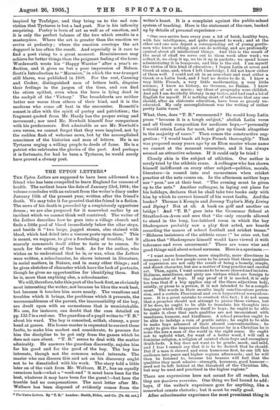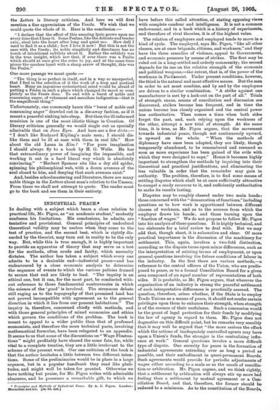THE Upton Letters are supposed to have been addressed to
a friend who has been compelled to leave England for reasons of health. The earliest bears the date of January 23rd, 1904; the volume concludes with an extract from the writer's diary under January 15th of the present year, written after the friend's death. We may take it for granted that the friend is a fiction. The news of his death is preceded by a suspiciously opportune dream ; we are also prepared for it somewhat earlier by an incident which we cannot think well contrived. The writer of the Letters describes how he goes into a village church and finds a little pool of blood immediately below the altar steps, and beside it "two large, jagged stones, also stained with blood, which had dried into a viscous paste upon them." This is meant, We suppose, to give a foreboding of trouble ; but it scarcely commends itself either to taste or to reason. So Much for the setting of the book. As for the author, who wishes us to understand that he is, or was, when the Letters were written, a schoolmaster, he shows interest in literature, in social matters, in Nature, and in many other things ; and he gives sketches of character which have the look of portraits, though he gives no opportunities for identifying them. But he is, more than anything else, a schoolmaster.
We will, therefore, take this part of the book first, as obviously most interesting the writer, not because he likes the work best, but because it touches him more nearly. The vexations and troubles which it brings, the problems which it presents, the unreasonableness of the parent, the inaccessibility of the boy, are dwelt upon with an earnestness that is unmistakable. No one, for instance, can doubt that the case detailed on pp. 132-7 is a real one. The guardian of a pupil writes to "T. B." about his ward. The boy is conceited, selfish, clumsy, a poor hand at games. His house-master is requested to correct these faults, to make him modest and considerate, to procure for him the discipline to be got only from the games which he does not care about. "T. B." seems to deal with the matter admirably. He answers the guardian discreetly, cajoles him for his good and for the good of the boy. The boy has interests, though not the common school interests. The master who can discern this and act on his discovery ought not to be dissatisfied with his work. The story told a little later on of the visit from Mr. Welbore, M.P., has an equally veracious look—what a "week-end" it must have been for the host, whatever it may have been for the guest !—but here the trouble had no compensations. The next letter after Mr. Welbore has been disposed of evidently comes from the
* The Union Leiters. By "T. B." London : Smith, Elder, and Co. [a 13d. net.] writer's heart. It is a complaint against the public-school system of teaching. Here is the statement of the case, backed up by details of personal experience :— " One sees arrive here every year a lot of brisk, healthy boys, with fair intelligence, and quite disposed to work; and at the other end one sees depart a corresponding set of young gentle- men who know nothing, and can do nothing, and are profoundly cynical about all intellectual things. And this is the result of the meal of chaff we serve out to them week after week ; we collect it, we chop it up, we tie it up in packets; we spend hours administering it in teaspoons, and this is the end. I am myself the victim of this kind of education ; I began Latin at seven and Greek at nine, and, when I left Cambridge, I did not know either of them well. I could not sit in an arm-chair and read either a Greek or a Latin book, and I had no desire to do it. I knew a, very little French, a very little mathematics, a very little science; I knew no history, no German, no Italian. I knew nothing of art or music ; my ideas of geography were childish. And yet I am decidedly literary in my tastes, and had read a lot of English for myself. It is nothing short of infamous that any one should, after an elaborate education, have been so grossly un- educated. My only accomplishment was the writing of rather pretty Latin verse."
What, then, does "T. B." recommend ? He would keep Latin prose "because it is a tough subject," abolish Latin verse and all Greek composition for mediocre boys,—" personally I would retain Latin for most, but give up Greek altogether in the majority of cases." Then comes the constructive sug- gestion: "I would teach all boys French thoroughly." That was proposed many years ago by an Eton master whose name
we cannot at the moment remember, and it has always seemed an attractive scheme. If it could only be tried !
Closely akin is the subject of athletics. Our author is sorely tried by the athletic craze. A colleague who has shown himself indifferent on every other subject—politics, morals, literature—is roused into real earnestness when cricket practice at the nets comes on. In the afternoon neither boys nor "pros." are at their best. "The evening must be given up to the nets." Another colleague, in laying out plans for his holidays, declares that he shall take two books only with him by which to correct himself of his worst faults. And the books ? Thomas h Kempis and Jeremy Taylor's Holy Living and Dying ? Not at all. A book on golf and another on bridge ! And "T. B." goes into the Grammar School at Stratford-on-Avon and sees that "the only records allowed to stand in the long, low-latticed room in which the boy Shakespeare probably saw a play first acted, are boards recording the names of school football and cricket teams." "Hideous insistence of the athletic craze !" he cries out, but
allows that "Shakespeare himself would have viewed it with tolerance and even amusement." There are some wise and good things said about school sermons. Here is a specimen :—
"I want more homeliness, more simplicity, more directness in sermons ; and so few people seem to be aware that these qualities of expression are not only the result of being a homely, simple, and direct character, but are a matter of long practice and careful art. Then, again, I want sermons to be more shrewd and incisive. Holiness, saintliness, and piety are virtues which are foreign to the character of boys. If any proof of it is needed, it is only too true that if a boy applies any of the three adjectives holy, saintly, or pious to a person, it is not intended to be a compli- ment. The words in their mouths imply sanctimonious preten- sion, and a certain Pharisaical and even hypocritical scrupulous- ness. It is a great mistake to overlook this fact ; I do not mean that a preacher should not attempt to praise these virtues, but if he does, he ought to be able to translate his thoughts into language which will approve itself to boys ; he ought to be able to make it clear that such qualities are not inconsistent with manliness, humour, and kindliness. A school preacher ought to be able to indulge a vein of gentle satire; he ought to be able to make boys ashamed of their absurd conventionalism ; he ought to give the impression that because he is a Christian he is none the less a man of the world in the right sense. He ought not to uphold what, for want of a better word, I will call a feminine religion, a religion of sainted choir-boys and exemplary death-beds. A boy does not want to be gentle, meek, and mild, and I fear I cannot say that it is to be desired that he should. But if a man is shrewd and even humorous first, he can lift his audience into purer and higher regions afterwards; and he will then be listened to, because his hearers will feel that the qualities they most admire—strength, keenness, good humour— need not be left behind at the threshold of the Christian life, but may be used and practised in the higher regions."
There are expressions here not meant for all readers, but
they are Ocavavra avveroicre. One thing we feel bound to add: boys, if the writer's experience goes for anything, like a
somewhat ornate rhetoric ; but it must be really good.
After schoolmaster experience the most prominent thing in mention a fine appreciation of the Venite. We wish that we could quote the whole of it. Here is the conclusion
"I declare that the effect of this amazing lyrie grows upon me every time that I hear it. Some Psalms, like the delicate and tender cxix., steal into the heart after long and quiet use. How dull I used to find it as a child ; how I love it now ! But this is not the case with the Venite; its noble simplicity and directness has no touch of intentional subtlety about it. Rather the subtlety was in the true insight, which saw that, if ever there was a Psalm which should at once give the reins to joy, and at the same time pierce the careless heart with a sharp arrow of thought, this was the Psalm."
One more passage we must quote :— "The thing is so perfect in itself, and in a way so unexpected, that I feel in the selection of it the work of a deep and poetical heart. Many an ingenious ecclesiastical mind would be afraid of putting a Psalm in such a place which changed its mood so com- pletely as the Venite does. To end with a burst of noble and consuming anger, of vehement and merciless indignation—that is the magnificent thing."
Unfortunately, one commonly hears this "burst of noble and consuming anger" drawled out in a die-away fashion, as if it meant a peaceful sinking into sleep. But then the ill-informed musician is one of the most idiotic things in Creation. Of
literary criticism generally we would single out as specially admirable that on Acne Eyre. And here are a few dicta:— " I don't like Rudyard Kipling's male men; I should dis- like them and be ill at ease with them in real life." How about the old Lama in Kim? "For pure imagination I should always fly to a book by H. G. Wells. He has
that extraordinary power of imagining the impossible, and working it out in a hard literal way which is absolutely Convincing." "Herbert Spencer sits like a dry old spider, spinning his philosophical web, with a dozen avenues of the soul closed to him, and denying that such avenues exist."
' And, besides schoolmastering and literature, there are many noble things in the Letters about man's relation to the Unseen.
From these we shall not attempt to quote. The reader must go to the book and see them in their entirety.



































 Previous page
Previous page